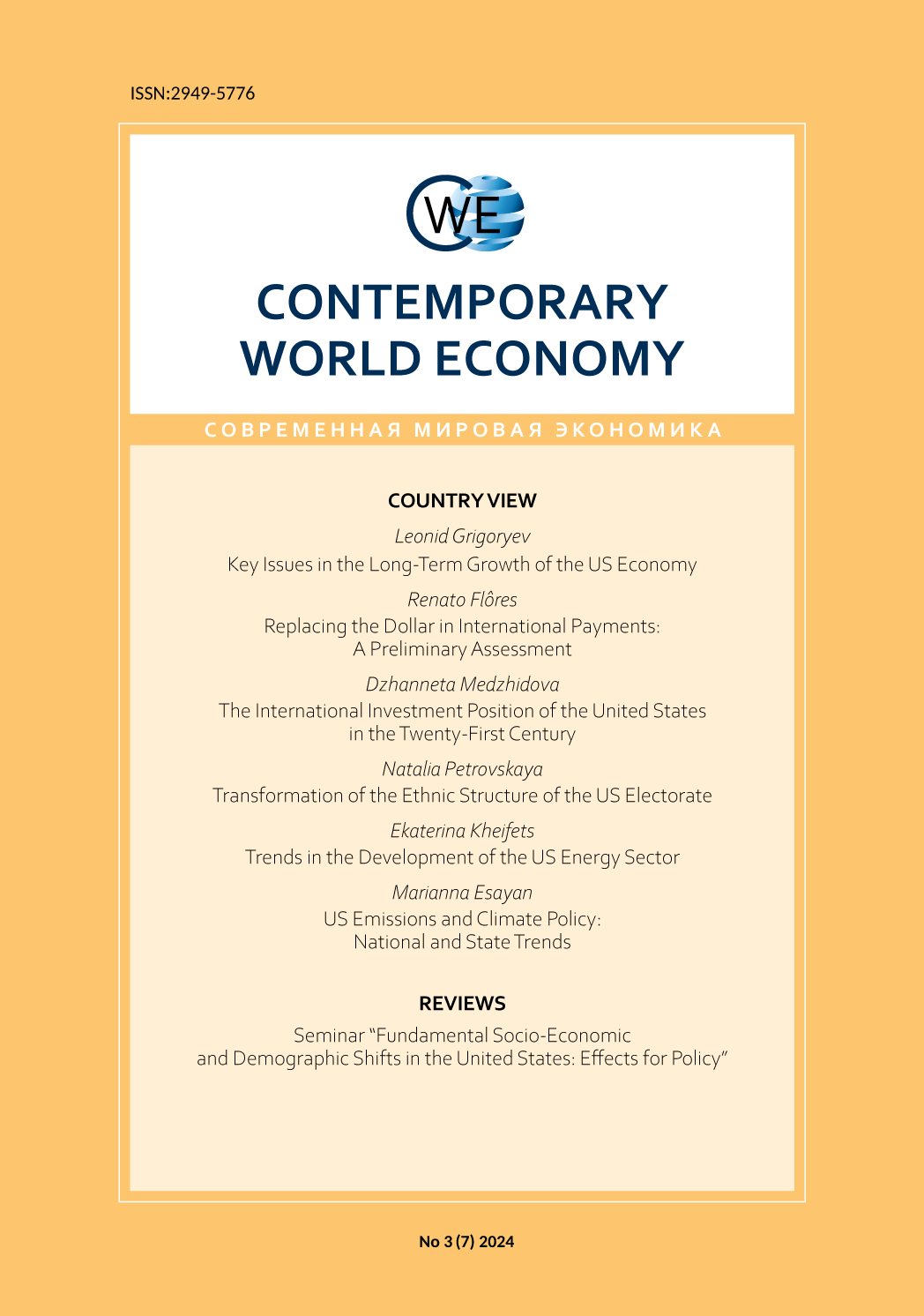Trends in the Development of the US Energy Sector
Abstract
The paper examines the historical prerequisites of the formation of the US fuel and energy sector. Over the past century, the United States has experienced numerous large-scale economic and energy market shocks, which have led to the prioritization of achieving energy security at the national level. The article considers geographical structure of oil and gas trade, as well as domestic sectoral demand. The study assesses the potential ramifications of a novel industrial policy on domestic energy demand and undertakes a comprehensive analysis of the investment cycle of oil and gas companies, which exhibits a notable sensitivity of capital investments to price dynamics. The study also noted the insignificant impact of the climate lobby on emission levels and demand for fossil fuels.
Downloads
References
Bloomberg, 2024. Oil Was Written Off. Now It’s the Most Productive US Industry. Available at: https://www.bloomberg.com/news/features/2024-10-31/why-oil-is-outpacing-tech-as-the-most-productive-us-industry?srnd=phx-markets
Deloitte, 2023. 2024 power and utilities industry outlook. Available at: https://www2.deloitte.com/us/en/insights/industry/power-and-utilities/power-and-utilities-industry-outlook.html
Draghi, M., 2024. The Future of European Competitiveness Part B: In-depth Analysis and Recommendations. European Commission. Available at: https://coilink.org/20.500.12592/9y7v1o8
EIA, 2015. Sustained low oil prices could reduce exploration and production investment. Available at: https://www.eia.gov/todayinenergy/detail.php?id=23072
EIA, 2024a. Decline in natural gas price drove decrease in US oil producer revenue in early 2024. Available at at: https://www.eia.gov/todayinenergy/detail.php?id=63204
EIA, 2024b. North America’s LNG export capacity is on track to more than double by 2028. Available at: https://www.eia.gov/todayinenergy/detail.php?id=62984
EIA. EIA database. Available at: https://www.eia.gov/opendata/
Energy Institute, 2024. Energy Institute Statistical Review of World Energy. Available at: https://www.energyinst.org/statistical-review/resources-and-data-downloads
Erlingsen, E., Busby, E., 2024. “Shale project economics still reign supreme as the cost of new oil production rises further. Rystad Energy.” Available at: https://www.rystadenergy.com/news/upstream-breakeven-shale-oil-inflation
Esayan, M.A., 2024. US Emissions and Climate Policy: National and State Trends. Contemporary World Economy, Vol. 2, No 3.
Fattouh, B., Sen, A., 2013. The US Tight Oil Revolution in a Global Perspective. Oxford Energy Comments. September 2013. Available at: https://www.oxfordenergy.org/wpcms/wp-content/uploads/2013/09/Tight-Oil.pdf
Goldman Sachs, 2024. AI, data centers and the coming US power demand surge. Available at: https://www.goldmansachs.com/pdfs/insights/pages/generational-growth-ai-data-centers-and-the-coming-us-power-surge/report.pdf
Grigoryev, L.M., 2024. Key Issues in the Long-Term Growth of the US Economy. Contemporary World Economy, Vol. 2, No 3.
Grigoryev, L.M., Kheifets, E.A., 2022. Oil market: Conflict between recovery and energy transition. Voprosy Ekonomiki, No 9. P. 5–33. Available at: https://doi.org/10.32609/0042-8736-2022-9-5-33
Hacquard, P., Simoën, M., Hache, E., 2019. Is the oil industry able to support a world that consumes 105 million barrels of oil per day in 2025? Oil & Gas Science and Technology, No 88. Available at: https://doi.org/10.2516/ogst/2019061
IEA, 2021. World Energy Investment 2020. Available at: https://iea.blob.core.windows.net/assets/ef8ffa01-9958-49f5-9b3b-7842e30f6177/WEI2020.pdf
IEA, 2024. United States 2024 Energy Policy Review. Available at: https://iea.blob.core.windows.net/assets/b5826832-7182-4abe-9041-01c9f000d69d/UnitedStates2024.pdf
OPEC, 2024. World Oil Outlook 2050. Vienna. Available at: https://publications.opec.org/woo/Home
Rubio-Vars, M., 2006. The Role of Mexico in the First World Oil Shortage: 1918–1922, an International Perspective. Journal of Iberian and Latin American Economic History, No 24(01). P. 69–95. Available at: https://doi.org/10.1017/S0212610900000471
S&P Global, 2020. Half of producing shale oil wells are profitable at $40/bbl, analyst says. Available at: https://www.spglobal.com/marketintelligence/en/news-insights/latest-news-headlines/half-of-producing-shale-oil-wells-are-profitable-at-40-bbl-analyst-says-60035427
Stocker, M., Baffes, J., Vorisek, D., 2018. What triggered the oil price plunge of 2014–2016 and why it failed to deliver an economic impetus in eight charts. In: Global Economic Prospects: Broad-Based Upturn, but for How Long? World Bank. Available at: https://doi.org/10.1596/978-1-4648-1163-0



1.jpg)

